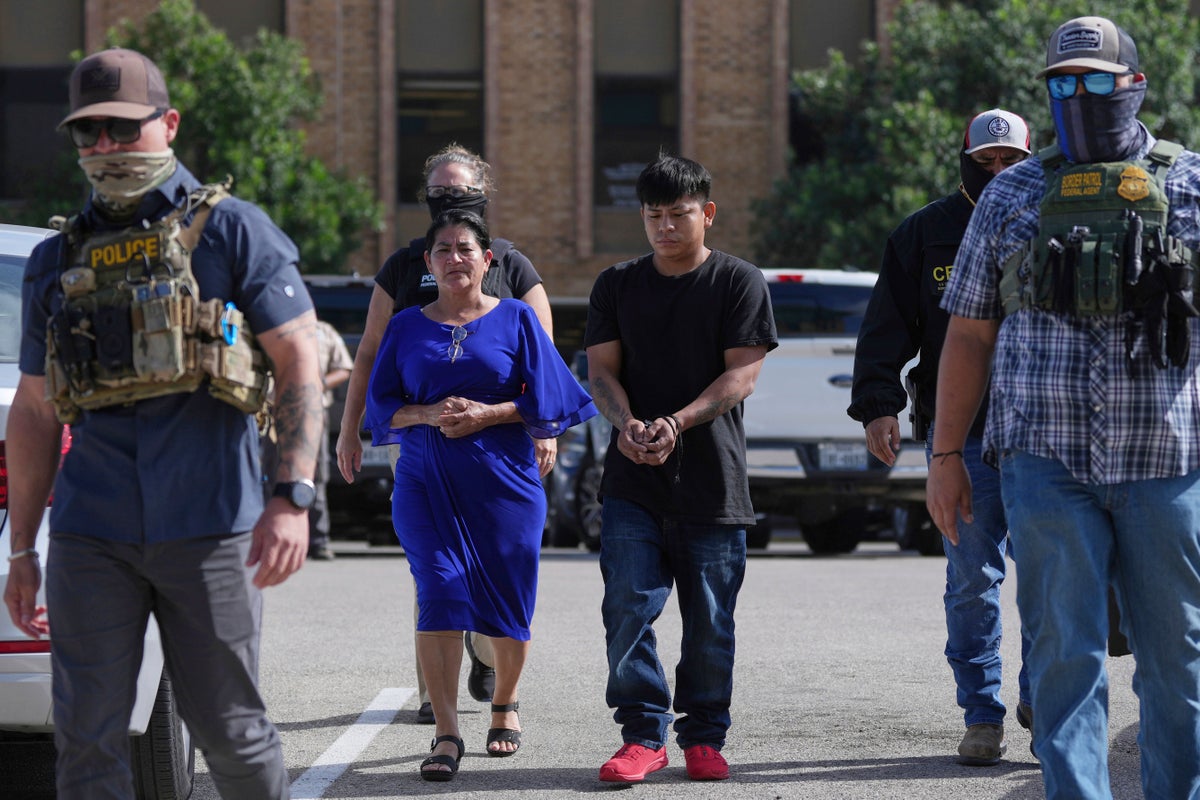
After firing or forcing out dozens of immigration court judges, the Trump administration is planning to fill the benches with military lawyers under command of the Department of Justice.
Last week, the Justice Department’s Executive Office for Immigration Review gave itself permission to hire “any attorney” to serve as temporary immigration judges, even if they don’t have any experience in that area of the law.
Defense Secretary Pete Hegseth has now approved sending up to 600 military lawyers to the Justice Department to fill the bench in immigration courts across the country, according to a recent memo.
The Pentagon will deploy groups of 150 military attorneys “as soon as practicable,” according to the memo, which is dated August 27.
The Independent has requested comment from the Department of Defense. The Justice Department referred The Independent to the Pentagon.
Immigration courts are grappling with a massive backlog of more than 3.7 million cases in immigration courts which hold hearings on asylum claims and whether immigrants can be swiftly deported.
But more than 100 immigration judges have been fired or forced out of the role since Trump took office.
Unlike federal courts, immigration courts and the judges who run them operate under the Justice Department and at the direction of the office of the attorney general.
Under new guidance released last week, Attorney General Pam Bondi can install “any attorney” to serve as an immigration judge for terms lasting up to six months — at which point their term can be renewed, sparking fears that the Trump administration is escalating an anti-immigration agenda by employing inexperienced loyalists to decide the fates of tens of thousands of people.
After Trump took office, the Justice Department’s Executive Office for Immigration Review told judges to grant motions from government lawyers to immediately dismiss immigrants’ cases, making them easy targets for arrest and removal.
That strategy has generated scenes of masked federal agents patrolling courthouse hallways and hauling away immigrants the moment they leave hearings. More than 60,000 people are currently in immigration detention centers across the country.
Before last week’s rule change, temporary immigration judges had to be a former appellate immigration judge; an administrative law judge at the Executive Office for Immigration Review; or an attorney with more than 10 years of experience in immigration law.
Now, the Justice Department says experience with immigration law isn’t necessary.
“Immigration law experience is not always a strong predictor of success” as an immigration judge, according to last week’s rule change.
Attorneys with the Judge Advocate General’s Corps — or JAG, the military’s legal branch — have served as immigration judges in the past, “so I am not of the belief that they will all become rubber stampers,” according to American Immigration Council senior fellow Aaron Reichlin-Melnick.
“But the command pressure to deny will undoubtedly be enormous,” he wrote Tuesday.
There are also not enough immigration courtrooms to “suddenly add hundreds of new judges,” Reichlin-Melnick said. “The logistics are going to be a complete disaster.”
Rear Admiral Donald J. Guter, a retired Navy Judge Advocate General and former president and dean of South Texas College of Law, called the administration’s latest move another “unprecedented action, and unwise.”
“It’s another authoritarian step toward militarizing civilian functions, compromises the statutory role of JAGs, reduces readiness and is a specialized area in which the JAGs have no training or experience,” he told The New York Times.
Like the Trump administration’s deployment of hundreds of National Guard troops and Marines into the streets of Los Angeles, inserting the military “into polarizing domestic issues that risk politicizing the military itself,” Guter and other former JAG attorneys wrote in The Bulwark.
“The dangers of politicizing the military are twofold: Domestic uses of our military render it less prepared to perform its primary missions, and inject the military into civilian situations our troops are not trained for,” they wrote.
The International Federation of Professional and Technical Engineers, the union that represents immigration judges, told The Independent that it supports filling temporary immigration judge positions “through a transparent, merit-based process that takes into consideration an individual’s background, legal experience, knowledge of immigration law or judicial procedures, and experience in administrative law.”
“Hiring judges without adequate experience or knowledge of immigration laws could slow the system down and increase appeals,” the union said.
The administration’s actions to strip legal status from immigrants who are in the middle of their immigration cases have radically expanded a pool of “undocumented” people to add to the president’s demands for mass deportations.
A federal judge in New York last month condemned the Trump administration’s “arbitrary” practice of arresting immigrants as they leave their court hearings, which has created what he called a “game of detention roulette” that violates due process.
Another federal judge last week blocked immigration authorities from rapidly deporting immigrants by using a fast-tracked removal process central to the president’s mass deportation agenda.
District Judge Jia M. Cobb in Washington, D.C. argued that the administration risks wrongfully removing people and violating due process rights for people who have “long since entered” the country.
“Prioritizing speed over all else will inevitably lead the government to erroneously remove people via this truncated process,” she wrote.
“The government could accuse you of entering unlawfully, relegate you to a bare-bones proceeding where it would ‘prove’ your unlawful entry, and then immediately remove you,” Cobb explained. “By merely accusing you of entering unlawfully, the government would deprive you of any meaningful opportunity to disprove its allegations. Fortunately, that is not the law.”
